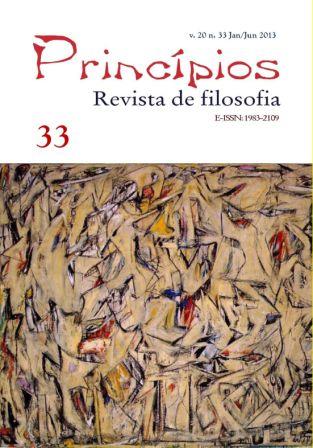COMO NÃO LER FOUCAULT E DELEUZE? OU: PARA LER FOUCAULT E DELEUZE POLITICAMENTE
Keywords:
Foucault, Deleuze, Ética, PolíticaAbstract
O artigo discute como interpretar a dimensão política da obra de Michel Foucault e Gilles Deleuze (com ou sem seu parceiro de escritura Félix Guattari), contrapondo-se a tendências e clichês interpretativos que são comuns tanto a alguns críticos quanto a alguns partidários destes autores. Em particular, questiona a ideia de que, para ambos, haveria uma relação de exclusividade mútua entre “micro” e “macropolítica”, tema que desenvolve em direções conexas – no tocante, por exemplo, a forma como ética e política se articulam no pensamento dos dois.Downloads
References
BADIOU, Alain. Metapolitics. Londres: Verso, 2005.
CHOMSKY, Noam; FOUCAULT, Michel. “De la nature humaine: justice contre pouvoir”, Dits et écrits, vol. I. Paris: Gallimard, 2001 (1974), pp. 1339-1380.
DELEUZE, Gilles. Logique du sens. Paris: Minuit, 2002.
____________. Différence et répétition. Paris: PUF, 2003.
____________. Spinoza. Philosophie pratique. Paris: Minuit, 2003a.
____________. “Désir et plaisir”. Deux régimes de fous. Paris: Minuit, 2003b.
____________. “Lettre-préface de Gilles Deleuze”. MARTIN, Jean-Clet. Variations: la philosophie de Gilles Deleuze. Paris: Payot, 1993.
DELEUZE, Gilles; GUATTARI, Félix. Qu’est-ce que la philosophie? Paris: Minuit, 2003.
____________. Mille plateaux. Paris: Minuit, 2004.
DELEUZE, Gilles; NEGRI, Toni. “Contrôle et devenir”. Pourparlers, Paris: Minuit, 2007, p. 232.
FOUCAULT, Michel. “Préface à la transgression”. Dits et écrits, vol. I. Paris: Gallimard, 2001 (1963), pp. 261-278.
____________. “La pensée du dehors”. Dits et écrits, vol. I. Paris: Gallimard, 2001 (1966), pp. 546-567.
____________. “Entretien sur la prison: le livre et sa méthode”. Dits et écrits, vol. I. Paris: Gallimard, 2001 (1975), pp. 1608-1621.
____________. “Pouvoir et corps”. Dits et écrits, vol. I. Paris: Gallimard, 2001 (1975a), pp. 1622-1628.
____________. “Asiles. Sexualités. Prisons”. Dits et écrits, vol. I. Paris: Gallimard, 2001 (1975b), pp. 1639-1650.
____________. “Préface”. Dits et écrits, vol. II. Paris: Gallimard, 2001 (1977), pp. 133-136.
____________. “Le jeu de Michel Foucault”. Dits et écrits, vol. II. Paris: Gallimard, 2001 (1977a), pp. 298-329.
____________. “Non au sexe roi”, Dits et écrits, vol. II, Paris: Gallimard,
(1977b) pp. 256-69.
____________. “De l’amitié comme mode de vie”. Dits et écrits, vol. II. Paris: Gallimard, 2001 (1981), pp. 982-986.
____________. “Politique et éthique: une interview”. Dits et écrits, vol. II. Paris: Gallimard, 2001 (1981), pp. 1403-1409.
____________. “Polémique, politique et problématisations”. Dits et écrits, vol. II. Paris: Gallimard, 2001 (1984a), pp. 1410-1417.
____________. Les mots et les choses. Paris: Gallimard, 2001.
____________. L’Usage des plaisirs. Paris: Gallimard, 2003.
____________; YOSHIMOTO, R. “Méthodologie pour la connaissance du monde: comment se débarasser du marxisme”. Dits et écrits, vol. II. Paris: Gallimard, 2001 (1984a), pp. 595-618.
GUATTARI, F. “Causality, subjectivity, history”. Molecular revolution. Londres: Penguin, 1984, pp. 175-207.
___________. Psychoanalysis and the struggles of desire. Molecular revolution. Londres: Penguin, 1984a, pp. 62-72.
___________. “The left as processual passion”. GENOSKO, G. (ed.) The Guattari Reader. Oxford: Blackwell, 1996, pp. 259-61.
___________. “A new alliance is possible”. Soft Subversions. Cambridge, MA: Semiotext(e)/MIT Press, 2009, pp. 113-27.
___________. “New spaces of liberty”. Soft Subversions. Cambridge, MA: Semiotext(e)/MIT Press, 2009, pp. 94-101.
HOLLOWAY, J. Change the World Without Taking Power. Londres: Pluto, 2005, 2a. ed.
KAPLAN, H. R. The myth of post-racial America: searching for equality in the age of materialism. Lanham: Rowman and Littlefield, 2011.
MACHEREY, P. “Le sujet productif”. La philosophie au sens large, 15 de maio de 2012. http://philolarge.hypotheses.org/1245
MARSDEN, R. The nature of capital. Marx after Foucault. Londres: Routledge, 1999.
NOYS, B. The persistence of the negative. Edimburgo: Edinburgh University Press, 2010.
NUNES, R. “Politics in the middle: for a political interpretation of the dualisms in Deleuze and Guattari”. Deleuze Studies 4, 2010, pp. 104-126.
READ, J. The micro-politics of capital. Marx and the pre-history of the present. Stony Brook: SUNY Press, 2003.
SIMONDON, G. L’individuation à la lumière des notions de forme et d’information. Grenoble: Jerôme Millon, 2005.
THOBURN, N. Deleuze, Marx and politics. Londres: Routledge, 2003.
VÁRIOS. Change the world without taking power?... Or take power to change the world? Amsterdã: International Institute for Research and Education, 2006.
VIVEIROS DE CASTRO, E. Métaphysiques cannibales, Paris: PUF, 2009.
ZIZEK, S. Organs without bodies. Deleuze and consequences. Londres: Routledge, 2004.
ZIZEK, S. In defense of lost causes. Londres: Verso, 2008.
Downloads
Published
How to Cite
Issue
Section
License
Authors retain copyright and grant the journal right of first publication with the work simultaneously licensed under a Creative Commons Attribution License that allows others to share the work with an acknowledgement of the work's authorship and initial publication in this journal.


 Português (Brasil)
Português (Brasil) English
English Español (España)
Español (España) Français (Canada)
Français (Canada)


